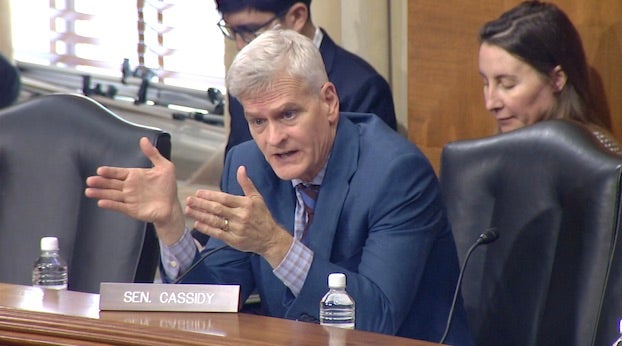Feeling down? It’s OK to seek help. Really.
Published 6:09 am Monday, May 29, 2023

- (Metro Creative Services)
Although it’s not always easy to talk about, mental health is an important topic.
With May being recognized as Mental Health Awareness Month, Shannon Cox Counseling Center counselor Logan Tijerina said now is the time to raise awareness about mental health and reduce the stigma that surrounds the illness.
“There is this giant stigma about mental health that your world has to be ending in order to talk to someone about it and that’s not necessarily the case,” she said. “Yes, please talk to someone whenever you feel that way, but it may just be that you’re having a minor inconvenience and need some guidance. It’s not always the over-the-top kind of thing.”
Trending
She said mental health can also encompass things like communication skills.
“It can be, ‘I need some help talking to my friend about this. She crossed a boundary. How do I talk to her about it?’ or it could be, ‘Hey, I’m having some deep, dark, scary thoughts. How do I handle that?’ There’s a wide range of things we can talk about,” she said.
It’s better to talk about such things as opposed to bottling them up inside — something Tijerina knows first hand.
“I was raised with a ‘conceal-don’t-feel’ mentality like Elsa (a character in the popular Disney franchise “Frozen),” she said. “Once I got into college, I realized you’re supposed to talk about things, you’re supposed to have people in your community. It seems like there isn’t a village anymore of people around you, supporting you and helping you grow.”
People are meant to have people in their corners, being their cheerleaders, she said.
“It’s important to have people around you who can say, ‘Hey, it’s OK that you’re going through this.’ ”
Trending
Tijerina said she finds the stigma around mental health to be a generational one, an idea passed down through the ages.
“But I’m hopeful that stigma is going away now in the younger generations,” she said. “They’re being more open and they’re talking about it more.”
Tijerina said some symptoms of poor mental health are fatigue, irritability, someone who is no longer finding joy in things they previously did, someone sleeping more or less — or even eating more or eating less.
“If you’re seeing major changes in your mood, attitude and the way you talk to people, those are the signs to look for,” she said. “There is this concept called the cognitive triangle where you have your thoughts, your feelings and your actions. It’s hard to identify our thoughts and our feelings because those things happen internally, but something that is tangible that we can see is our actions. That’s what we can pick up on if something is off. Be conscious and aware of what your actions are and have people in your community willing to speak up when they notice something.”
Self-care is the way to maintain mental health, she said.
“Take five minutes out of your day to do something that doesn’t benefit anyone else but you,” she encouraged. “As a recent mom, that is something that I struggled with in the beginning. When I started taking my own advice and taking five minutes a day to do something for me, I noticed that a lot of my symptoms that I was feeling were easing. I was more cheerful, I was able to hold conversations with people, I had so much more patience. I think as a community and a society we are aware of everyone else but not ourselves and what it is that we’re going through.”
Self-care can be taking a long shower, getting a facial when it’s not something normally in your skin care routine, going outside for a walk, cooking something for dinner when you normally would have eaten Ramen noodles — something that’s intentional for you.
“Talking to someone is also great self-care and if you feel you don’t have anyone to talk to there’s so many resources out there,” she said. “You can come here or we offer telehealth sessions — I do it all day long. Find a confidant. Consistency is key, too. That’s how habits are formed and that’s when we start to notice the changes in ourselves and in our environment.”
Tijerina said it’s not selfish to self-care.
“Did you eat breakfast this morning? Do you consider that selfish? You did that for yourself because it was a need that you had,” she said. “Just like you would go to a doctor to get a treatment plan for when you’re physically sick, you do the same thing when you’re feeling mentally sick. You have to rest, you have to take care of yourself. Doing that is not a selfish act. On the airplane they tell you to put your mask on before you can help someone else, this is the exact same concept.”
The Shannon Cox Counseling Center is under the umbrella of Family & Youth and offers services 8 am.-7 p.m. Monday-Thursday and 8 a.m.-5 p.m. on Friday.
“If you have to come after work, you’re more than happy to,” she said.
Additional mental health services are offered for postpartum depression.
“Postpartum isn’t something that only mothers deal with,” she said. “It’s something for anyone who has had a birthing experience — the father being in the room, anyone who has lost a child, men who have lost their wives during childbirth, people who have had miscarriages, people who are having trouble conceiving. It’s not just mothers who have physically delivered; it’s for anyone who has a traumatic experience surrounding birth and a child. These services we offer can be so beneficial because it’s adding another cheerleader in your corner, someone to say, ‘Hey, you’re doing great. I’m so proud of you.’ ”
Tijerina said counseling isn’t sharing one’s deepest, darkest secrets.
“Sometimes, a client comes in and it’s, ‘Hey, did you see what happened on ‘Desperate Housewives?’ We meet clients where they’re at and not push them into where they need to go.”
Tijerina said Family & Youth takes a strength-based approach with its services.
“We say, ‘Let’s empower, let’s encourage.’ Yes, this is a situation you probably don’t want to be in, but how can we empower you and how can we encourage you,” she said. “We have resources to help. We can be your cheerleaders and help you get to where you need to be at your pace.”
For more information, call 337-436-9533.





